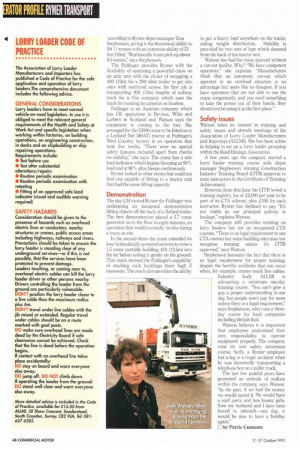LORRY LOADER CODE OF PRACTICE
Page 52

If you've noticed an error in this article please click here to report it so we can fix it.
The Association of Lorry Loader Manufacturers and Importers has published a Code of Practice for the safe application and operation of lorry loaders.The comprehensive document includes the following advice.
GENERAL CONSIDERATIONS Lorry loaders have to meet normal vehicle-on-road legislation. In use it is obliged to meet the relevant general requirements of the Health and Safety at Work Act and specific legislation when working within factories, on building operations, on engineering construction, in docks and on shipbuilding or ship repairing operations.
Requirements include: Test before use Test after substantial alterations/repairs Routine periodic examination Routine periodic examination with retesting Fitting of an approved safe load indicator (visual and audible warning required) SAFETY HAZARDS Consideration should be given to the presence of hazards such as overhead electric lines or conductors, nearby structures or cranes, public access areas including highways, railways and rivers. Precautions should be taken to ensure the lorry loader is standing clear of any underground services—or if this is not possible, that the services have been protected to prevent damage.
Loaders touching, or coming near to, overhead electric cables can kill the lorry loader driver or other persons nearby. Drivers controlling the loader from the ground are particularly vulnerable. DON'T position the lorry loader closer to a live cable than the maximum radius plus 6m.
DON'T travel under live cables with the jib raised or extended. Regular travel under cables should be on a route marked with goal posts.
make sure overhead lines are made dead by the Electricity Board if safe clearances cannot be achieved. Check that the line is dead before the operation begins.
If contact with an overhead line takes place accidentally:
DO stay on board and warn everyone else away.
DO jump off. DO NOT climb down. If operating the loader from the ground: DO stand well clear and warn everyone else away.
































































































